Ryan Henry Gundersen Health System
On rural Monroe County roads usually reserved for tractors, pickups and Amish buggies, an out-of-place, though welcomed, vehicle ambles through the rolling hills. It pulls into gravel driveways of preselected farms, swings its doors open, and invites the laborers — typically migrant workers from Central America — to come inside if they’re suffering from any sort of physical ailment.
Last fall, physicians and residents from Gundersen Health System joined St. Clare Health Mission in providing health care services on location with St. Clare’s Rotary Mobile Clinic, a full-scale, full-service family medicine unit that was unveiled in August. Its purpose was to better equip the two organizations to meet the needs of La Crosse’s unsheltered population, which it has visited on a weekly basis since 2020.
But that team discovered another need — one of those living and working in rural areas who are new to the health care system in the United States and face several barriers to receiving much-needed treatment. So, beginning in October, the team set out for the country two Fridays each month — which they call Fridays at the Farm — rotating stops between several farms in Gundersen’s service area that employ a predominantly migrant workforce.
People are also reading…
Led by Dr. Sarah Brown, the attending physician and program coordinator, and joined by resident physicians from Gundersen’s Family Medicine Residency Program and St. Clare executive director Jason Larsen, the team sees anywhere from four to 15 patients each visit, providing acute care services and disease management services, including things like diabetes and cholesterol level checks. They also handle the unexpected injuries that occur while working on a farm.
“Musculoskeletal injuries have been pretty common,” Dr. Brown said. “We’ve had other unique cases like rare neurological conditions and a number of chronic conditions, too.”
She said many of the rural patients they encounter have access to care at their local hospital or clinic, but predominantly on an emergency basis. The idea behind the visits is to treat a condition early on in hopes of avoiding those trips to the emergency room.
“We’re getting to know a lot of people gradually,” Dr. Brown said. “We try to keep people connected to health systems or build a bridge back to health care, if possible.”
But that’s not the program’s only objective. As a training tool for residents, they’re able to work in a setting that helps foster a deep understanding of the social determinants of health — those constraints in a person’s day-to-day life that limits their access to the health care system.
“It forces us to be creative in using our knowledge and skill set to select appropriate medications and appropriate plans of care, considering those constraints,” Dr. Brown said. “There are a lot of people in marginalized communities for whom best practices care in medicine can’t apply because they’re not able to form their lives around the treatment plans we’re trying to create.”
Second-year resident Dr. Kate Edsall made her second trip to the Farm on Dec. 2. She was on a rural surgery rotation, which allowed her time to accompany Dr. Brown and the mobile medicine team on the visits. For her, rounds at the farm allow her to get to know people in the community who she wouldn’t otherwise see.
“This is our community,” Dr. Edsall said. “This is a part of our community, but when we stay in the walls of our clinic, we don’t always see all of that. We kind of have to scratch below the surface a little bit.”
She said the people she sees do an admirable job of taking care of themselves, despite the barriers to health care they face.
“A lot of the patients here, they’re very proactive about their care, they’re very aware of family history,” Dr. Edsall said. “Being able to bring care to people and help to break down some of those barriers is a really neat opportunity and what we should be doing if we want to have healthy communities.”
This work, Dr. Edsall said, helps remind her of why she got into medicine.
“Most of us, especially in Family Medicine, got into this because we care about healthy communities and helping everyone get good health care and bridge those gaps in health care inequities,” she said. “It helps bring you back to your purpose and fuel you throughout the rest of your difficult rotations and difficult things we’re doing throughout our training. It’s very grounding.”
As an organization, Gundersen makes caring for people and their communities a top priority, and as members of the community, farm workers deserve that same care.
“We view health care as a basic human right,” Dr. Brown said. “Not only is caring for people morally the right choice, but our hope is also that caring for people with regularity can help prevent complications from long term diseases, prevent overutilization of emergency services and even reduce hospitalization rates.”
And thanks to the fundraising efforts of the Gundersen Medical Foundation, this mobile medicine work will continue, as the foundation gathered enough to fund the program through May 31, 2024. However, the need is ongoing, so if you’d like to contribute to the program, go online to foundation.gundersenhealth.org/donate-now, select “other” in the dropdown menu and reference mobile medicine, or stop in the foundation office at 201 Third St. N.
IN PHOTOS: UW-La Crosse donates gift baskets to health care workers
Donations

UW-La Crosse staff and faculty deliver gift baskets Tuesday afternoon at Gundersen.
Brooke Doval Gundersen Health System
Donations
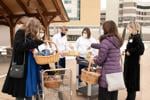
Donations from the UW-L campus community are delivered at Gundersen.
Brooke Doval Gundersen Health System
Donations

Nurses and a representative from the Gundersen Medical Foundation met the UW-L students and faculty.
Brooke Doval Gundersen Health System
Donations
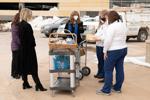
Donations from the UW-L campus community are delivered at Gundersen.
Brooke Doval Gundersen Health System
Donations
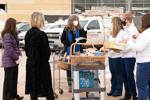
The gifts — including snacks, games, gift cards, thank-you notes and more — were donated by the UW-L campus community.
Brooke Doval Gundersen Health System
Donations
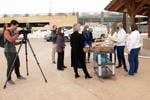
Donations from the UW-L campus community are delivered at Gundersen.
Brooke Doval Gundersen Health System
Donations
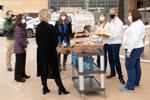
Donations from the UW-L campus community are delivered at Gundersen.
Brooke Doval Gundersen Health System
Donations
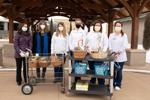
The gifts — including snacks, games, gift cards, thank-you notes and more — were donated by the UW-L campus community.
Brooke Doval Gundersen Health System
Donations
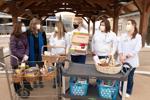
Donations from the UW-L campus community.
Brooke Doval Gundersen Health System
Donations
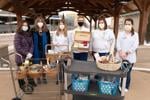
Nurses and a representative from the Gundersen Medical Foundation met the UW-L students and faculty.
Brooke Doval Gundersen Health System
.